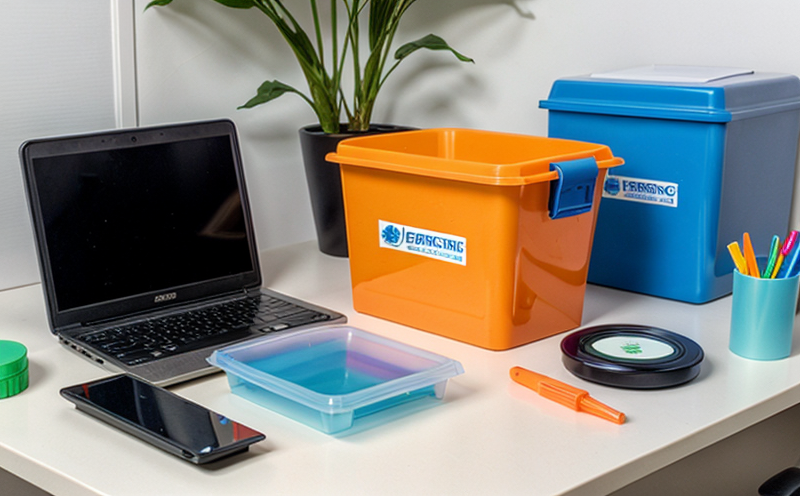JIS K 7215 Vicat Softening Temperature Testing of Plastic Stationery
The JIS K 7215 Vicat softening temperature test is a critical procedure used to evaluate the thermal stability and performance of plastic materials, particularly in office and stationery applications. This method quantifies the point at which a specified specimen begins to soften under heat load, providing essential data for product development, quality assurance, and compliance with international standards.
The Vicat softening temperature test is particularly relevant for assessing the durability and safety of plastic items used in daily office work and educational environments. By measuring the temperature at which the material starts to deform or melt when subjected to a specified load, it helps ensure that products meet specific performance requirements without compromising user safety.
The standard procedure involves placing a cylindrical specimen under a standardized load and gradually heating it until permanent deformation occurs. The temperature at this point is recorded as the Vicat softening temperature (VST). This value provides valuable information for manufacturers to optimize product design, ensuring that materials remain stable during typical use conditions while maintaining safety standards.
For office and stationery plastics, accurate VST testing is crucial because these products often come into contact with human hands or surfaces where they may be exposed to varying temperatures. Ensuring the material's stability within a safe temperature range prevents potential hazards such as burns from overheating or deformation under normal operating conditions.
Compliance with JIS K 7215 ensures that manufacturers adhere to stringent quality control measures, which is especially important for brands aiming to maintain high standards of product safety and reliability. Moreover, this testing method can help identify potential issues early in the development process, allowing for adjustments before large-scale production begins.
The Vicat softening temperature test also serves as a valuable tool for researchers working on new formulations or improvements to existing materials used in office supplies. By providing precise data about how different additives affect thermal properties, it supports ongoing advancements in material science and engineering.
In conclusion, the JIS K 7215 Vicat softening temperature test plays an indispensable role in ensuring that plastic stationery products meet rigorous quality standards while promoting user safety. Its application extends beyond mere compliance; it contributes significantly to advancing both current practices and future innovations within this sector.
Applied Standards
The JIS K 7215 Vicat softening temperature test is based on Japan Industrial Standard (JIS) K 7215, which specifies the method for determining the Vicat softening temperature of plastics. This standard ensures consistent and reliable testing across various industries, including office supplies.
The procedure outlined in JIS K 7215 requires specific apparatus such as a Vicat softening tester or similar device capable of applying a specified load to the sample while heating it uniformly until permanent deformation occurs. The tester must be calibrated according to relevant metrological guidelines to ensure accuracy and precision.
In addition to the primary equipment, specimens used in this test should meet certain criteria regarding size, shape, and preparation methods described within the standard document. These specifications are crucial for obtaining meaningful results that reflect actual material behavior under defined conditions.
Compliance with JIS K 7215 not only ensures adherence to international standards but also facilitates easier trade between countries that recognize these benchmarks. It provides a common language and set of procedures, enhancing interoperability among manufacturers, laboratories, and regulatory bodies worldwide.
Benefits
- Ensure product safety and compliance with industry regulations
- Identify potential issues early in the development process
- Optimize material selection for improved performance and durability
- Enhance reputation by demonstrating commitment to quality standards
- Facilitate easier trade through recognized international benchmarks
- Support continuous improvement in product design and manufacturing processes
Eurolab Advantages
EuroLab offers comprehensive testing services tailored specifically for the office and stationery plastics industry, leveraging our expertise to deliver accurate and reliable results. Our team of qualified professionals ensures that all samples are handled meticulously from receipt through analysis.
We utilize state-of-the-art equipment calibrated according to international standards, guaranteeing precise measurements essential for interpreting correct Vicat softening temperatures. The use of advanced technologies allows us to provide detailed reports that not only meet regulatory requirements but also offer valuable insights into material behavior under varying conditions.
Our commitment to excellence extends beyond just technical proficiency; we prioritize customer satisfaction by offering flexible appointment scheduling, clear communication throughout the testing process, and timely delivery of results. By partnering with EuroLab for your JIS K 7215 Vicat softening temperature tests, you can rest assured that your products will receive top-notch attention.





